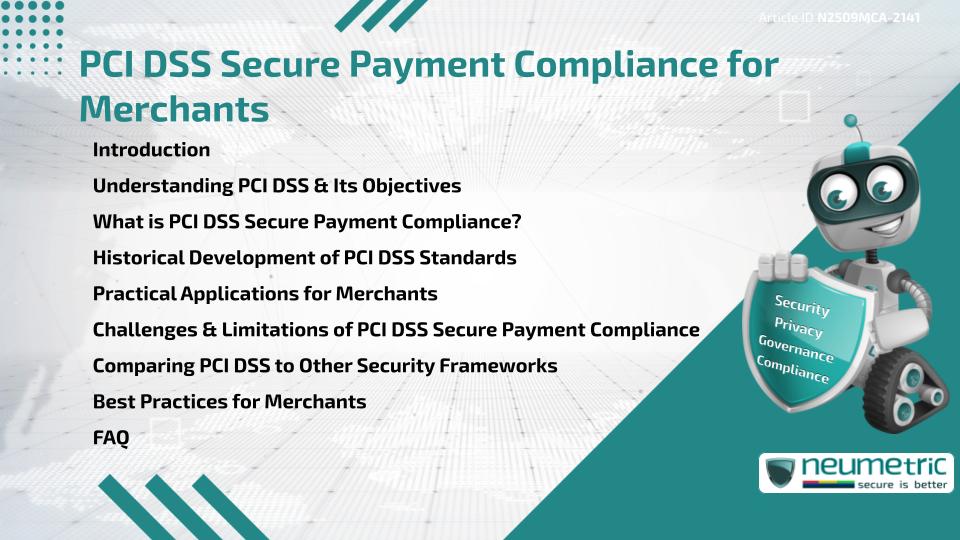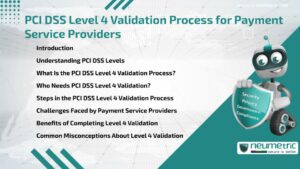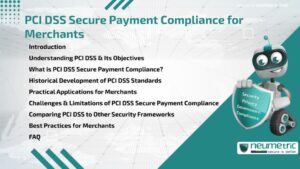Table of Contents
ToggleIntroduction
PCI DSS Secure Payment Compliance is a vital requirement for Merchants who process, store or transmit Credit Card Data. This Framework was created to ensure Secure Transactions & to protect Customers from Fraud & Identity Theft. Failure to comply can result in severe Financial Penalties, Reputational Damage & even the loss of the ability to process Card Payments. Understanding how PCI DSS works, its historical context, common challenges & industry Best Practices helps Merchants safeguard their businesses while protecting Consumer Trust.
Understanding PCI DSS & Its Objectives
The Payment Card Industry Data Security Standard [PCI DSS] was developed in 2004 by major Card Brands, including Visa, MasterCard, American Express, Discover & JCB. Its main objective is to establish a consistent set of Security Measures that safeguard Cardholder Data. These encompass the maintenance of Secure Networks, the implementation of robust Access Control, the regular monitoring of systems & the protection of stored Data. Merchants of all sizes must adhere to these requirements if they accept Card payments.
What is PCI DSS Secure Payment Compliance?
PCI DSS Secure Payment Compliance means aligning business practices with the standards outlined by the PCI Security Standards Council. It involves 12 core requirements that cover areas like:
- Building & maintaining a Secure Network.
- Protecting Cardholder Data through Encryption.
- Implementing Access Control measures.
- Monitoring & testing Networks regularly.
Merchants are categorized into levels based on transaction volume, which determines the type of compliance validation required, such as self-Assessment Questionnaires or on-site Audits.
Historical Development of PCI DSS Standards
Before PCI DSS, every Card brand had its own Security Program, resulting in differences for Merchants. The introduction of PCI DSS unified these programs into a single Standard, simplifying compliance. Over the years, updates have been made to address emerging Threats like Malware, Phishing & Ransomware. This evolution highlights the Standard’s adaptability to new Security challenges in the Payment Industry.
Practical Applications for Merchants
- Point-of-Sale Systems: Ensuring Card Data is encrypted during transactions.
- E-commerce Platforms: Securing Online Payment Gateways.
- Third Party Vendors: Verifying that Service Providers also comply with PCI DSS.
- Data Storage: Avoiding unnecessary retention of Cardholder Data & encrypting any essential storage.
These practices reduce the Risk of breaches & enhance Customer Trust in the Merchant’s Payment System.
Challenges & Limitations of PCI DSS Secure Payment Compliance
Compliance is not without its challenges. Merchants often face:
- Cost: Implementing Security Measures can be expensive.
- Complexity: Technical requirements may be difficult for smaller businesses.
- Ongoing Maintenance: Compliance is not a one-time effort; it requires Continuous Monitoring & updates.
Despite these challenges, compliance remains essential for protecting consumer data & avoiding penalties.
Comparing PCI DSS to Other Security Frameworks
Unlike general frameworks such as ISO 27001, PCI DSS is industry-specific, focusing solely on Payment Card Data. While GDPR in Europe addresses broader Data Privacy, PCI DSS zeroes in on Payment Security. This specialized focus makes PCI DSS uniquely relevant to Merchants handling Credit Card transactions.
Best Practices for Merchants
To effectively implement PCI DSS Secure Payment Compliance, Merchants should:
- Conduct regular Vulnerability Scans.
- Train Employees on secure handling of Payment Data.
- Use Encryption for all stored & transmitted Cardholder Data.
- Limit Data Access to authorised personnel only.
- Document & review compliance measures regularly.
These practices help Merchants not only achieve compliance but also build stronger security resilience.
Takeaways
- PCI DSS Secure Payment Compliance protects Cardholder Data & ensures safer transactions.
- The Standard evolved to unify security requirements across Card brands.
- Compliance involves practical measures like encryption, Access Control & monitoring.
- Merchants face challenges such as cost, complexity & ongoing maintenance.
- Best Practices include Vulnerability scanning, training & encryption.
FAQ
What is PCI DSS Secure Payment Compliance?
It is a Framework requiring Merchants to follow 12 Security Standards to protect Cardholder Data & ensure safe transactions.
Who needs to comply with PCI DSS?
Any Merchant or service provider that processes, stores or transmits Credit Card Data must comply with PCI DSS.
What happens if a Merchant is not compliant?
Non Compliance can lead to fines, legal consequences, reputational harm & loss of the ability to process payments.
How are Merchants categorised under PCI DSS?
They are classified into levels based on annual transaction volume, which determines the type of compliance validation required.
Does PCI DSS guarantee full protection against breaches?
No, but it provides a strong baseline that significantly reduces Vulnerabilities when implemented correctly.
How often should Merchants validate compliance?
Merchants must validate compliance annually, with some required to undergo quarterly Vulnerability scans.
How does PCI DSS differ from GDPR?
GDPR focuses on overall Data Privacy, while PCI DSS specifically addresses Payment Card Security.
Can Small Businesses comply with PCI DSS?
Yes, but they may complete simplified Self-Assessment Questionnaires rather than full Audits, depending on transaction volume.
References
Need help for Security, Privacy, Governance & VAPT?
Neumetric provides organisations the necessary help to achieve their Cybersecurity, Compliance, Governance, Privacy, Certifications & Pentesting needs.
Organisations & Businesses, specifically those which provide SaaS & AI Solutions in the Fintech, BFSI & other regulated sectors, usually need a Cybersecurity Partner for meeting & maintaining the ongoing Security & Privacy needs & requirements of their Enterprise Clients & Privacy conscious Customers.
SOC 2, ISO 27001, ISO 42001, NIST, HIPAA, HECVAT, EU GDPR are some of the Frameworks that are served by Fusion – a SaaS, multimodular, multitenant, centralised, automated, Cybersecurity & Compliance Management system.
Neumetric also provides Expert Services for technical security which covers VAPT for Web Applications, APIs, iOS & Android Mobile Apps, Security Testing for AWS & other Cloud Environments & Cloud Infrastructure & other similar scopes.
Reach out to us by Email or filling out the Contact Form…





